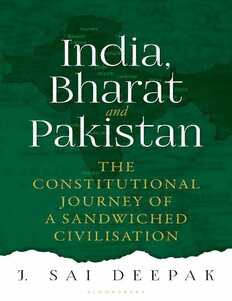
India, Bharat and Pakistan - THE CONSTITUTIONAL JOURNEY OF A SANDWICHED CIVILISATION PDF
Preview India, Bharat and Pakistan - THE CONSTITUTIONAL JOURNEY OF A SANDWICHED CIVILISATION
India, Bharat and Pakistan India, Bharat and Pakistan THE CONSTITUTIONAL JOURNEY OF A SANDWICHED CIVILISATION J . SAI DEEPAK BLOOMSBURY INDIA Bloomsbury Publishing India Pvt. Ltd Second Floor, LSC Building No. 4, DDA Complex, Pocket C – 6 & 7, Vasant Kunj, New Delhi 110070 BLOOMSBURY, BLOOMSBURY INDIA and the Diana logo are trademarks of Bloomsbury Publishing Plc First published in India 2022 This edition published 2022 Copyright © J. Sai Deepak, 2022 J. Sai Deepak has asserted his right under the Indian Copyright Act to be identified as the Author of this work All rights reserved. No part of this publication may be reproduced or transmitted in any form or by any means, electronic or mechanical, including photocopying, recording or any information storage or retrieval system, without the prior permission in writing from the publishers The book is solely the responsibility of the author and the publisher has had no role in creation of the content and does not have responsibility for anything defamatory or libellous or objectionable. Bloomsbury Publishing Plc does not have any control over, or responsibility for, any third-party websites referred to or in this book. All internets addresses given in this book were correct at the time of going to press. The author and publisher regret any inconvenience caused if addresses have changed or sites have ceased to exist, but can accept no responsibility for any such changes ISBN: HB: 978-93-54353-01-7, eBook: 978-93-54354-52-6 Created by Manipal Technologies Limited To find out more about our authors and books, visit www.bloomsbury.com and sign up for our newsletters For Amma, Appa, Akshara and Prasad Contents cknowledgements ntroduction ection 1: 1740–1898 . The Seeds of Pakistan The Fall of the Mughal Empire and the Rise of Pan-Islamic Movements in Bharat Syed Ahmad Shahid ‘Barelvi’ (1786–1831) Growth of the Wahhabi Movement after Barelvi (1831–1858) Exposure of the Wahhabi Network and the Law of Sedition (1858–1902) The Ahl-i-Hadith, Deobandi, Barelvi, Nadwah and Aligarh Movements Some Thoughts on the Ideology of Pan-Islamic Movements in the Subcontinent . Syed Ahmed Khan, the Aligarh Movement and the Two-Nation Theory Origins and Early Influences Rebellion, ‘Reformation’ and Reincarnation Aligarh The Two-Nation Theory Syed Jamal al-Din al-Afghani, Ummah and the Caliphate ection 2: 1899–1909 . The Partition of Bengal (1899–1905) . The Story of Moderate Nationalism, Muslim Nationalism and Electoral Separatism (1905–1909) Reactions to the Partition of Bengal The Colonial Origins of the Indian National Congress and Its ‘Moderate Nationalism’ (1876–1885) Growth of ‘Extremist Nationalism’ within the Indian National Congress (1885–1905) A Divided Congress, the Simla Deputation, the All-India Muslim League and the Minto–Morley Reforms (1905–1909) . The Indian Councils Act of 1909: Yet Another Ad Hoc Safety Valve (1907–1909) The Purge of the Nationalists, a Rising League and the Revolutionaries The Debates on the Indian Councils Act of 1909 ection 3: 1910–1924 . Reunification of Bengal, the First World War and the Lucknow Pact: Murmurings of Khilafat (1910–1916) Annulment of the Partition of Bengal and Muslim Displeasure (1910–1911) A Troubled Ummah, the First World War and the Lucknow Pact (1912–1916) . From the Home Rule Movement to Rumblings of Khilafat (1917–1918) The Montford Report and Reactions to It . Gandhi, Rowlatt, Government of India Act of 1919, Khilafat and Non-Cooperation (1919–1924) The Rowlatt Act and the Jallianwalla Bagh Massacre The Government of India Act of 1919 The Khilafat Movement until December 1918: A Summary The Khilafat Agitation and the Non-Cooperation Movement from 1919 to 1920 Hindu–Mussalman ki Jai: An Uneasy and Short-lived Bonhomie, 1921–1922 The Last Gasps of the Khilafat Agitation and of Hindu– Mussalman ki Jai (January 1923–December 1924) . Malegaon, Malabar, Gulbarga and Kohat: The Two-Nation Theory in Action 484 Malegaon, Gulbarga and Kohat The Moplah Outrage of 1921–1922: Peasant Rebellion or Hindu Genocide? A Short History of Fanaticism in the Malabar until 1921 The Khilafat and the Moplah Outrage of 1921 Legislative Debates on the Moplah Outrage Reactions in the Public Domain to the Moplah Outrage onclusion Appendix: Presidential Address of Syed Ali Imam, Amritsar Session, All-India Muslim League 1908 otes ndex Acknowledgements Ever since the release of the pre-orders for my first book, India That Is Bharat: Coloniality, Civilisation, Constitution, the first book of the Bharat Trilogy, on 7 July 2021, I have been constantly amazed and humbled by the reception it has received from readers in Bharat as well as abroad, who have ensured that the book remains a bestseller till date. This is not a thinly veiled attempt at self-congratulation but a genuine expression of gratitude to all the readers. The book has been embraced with extraordinary warmth and consumed in the manner it was intended to be—slowly, critically, meditatively, individually and collectively. That the readers did not let my archaic, rigid and formal style of writing (akin to legal drafting) come in the way of consumption of the ideas and contents of the book is to their credit and a testament to their faith in and patience with me. Interestingly, my decision to include extracts from sources has been received well by the readers. The subsequent dissemination of the book’s ideas and contents through reviews, podcasts, group reading sessions and book club discussions has contributed more layers to the book, liminal and subliminal, which was my hope. To all of them, I have only this to say— Dhanyavadam. As for those who offered their valuable and
